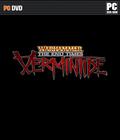In Warhammer: End Times - Vermintide, an apocalyptic time for the Warhammer world has arrived. The actual details are too complex to explain, but the by and large, things are extremely bad for everyone. The players take control of five characters, each from a different faction. The four we know of are: Dwarf Ranger, Empire Soldier, Waywatcher and Witch Hunter. The heroes must team up and fight their way through Skaven lands to survive the End Times.
The general idea of Vermintide draws inevitable comparisons to Left 4 Dead, and there are a lot of similarities. It's a four-player, drop-in/drop-out cooperative shooter with an emphasis on surviving the tide of rat-like Skaven that swarm you. Each of the classes has access to a melee weapon and a ranged weapon. The specific weapons vary by class, and that helps differentiate one class from another. For example, the Empire Soldier has brutal but slow weapons while the Waywatcher is quicker but weaker. The game always has four players, with any non-chosen characters being controlled by bots. Having five characters in a four-player game provides an element of choice. A player who hops in late will always have at least two characters to choose from, instead of being stuck with the leftover one.
It's easy to point to the Skaven and call them zombies, but it isn't so simple. The Skaven are cowardly and prefer to fight in numbers. Unlike zombies, who will rush you regardless of how many are nearby, the Skaven only want to fight if they have a numbers advantage. Come across a lone Skaven or two, and they'll take off to recruit some friends rather than stay and fight. It's an interesting twist because some tactics aren't viable. You could exploit the stupidity of zombies, but a lone Skaven isn't dumb enough to charge a heavily armed dwarf.
The Special Skaven are deadlier. Some take advantage of players in ways that are similar to the Special Infected in Left 4 Dead. For example, the Packmaster grabs players who are alone and tries to drag them away. The Gutterrunner ambushes players who are caught unawares. There are even gigantic Rat Ogres that can only be taken down with a concentrated effort from multiple characters. The Special Skaven aren't unstoppable, but they can disable lone characters. There are other kinds of Skaven that can randomly appear, such as heavily armored ones, which provide a straightforward challenge.
One of the cool features of Vermintide that isn't present in Left 4 Dead is character customization. There's a leveling system, but it isn't the traditional RPG variety. As described by the developers, it sounds akin to Call of Duty, where gaining levels is about additional choices rather than straight power gain. More significant than that are the loot items, which are gained by finishing missions or beating certain foes. You receive loot dice, which are rolled at the end of a mission and can earn various weapons or trinkets that you can equip on your characters.
Collecting loot is a big part of the game, and it will help add a lot of replay value to the missions. Rather than getting too strong and out-leveling your friends, the loot offers customization options that allow you to replay missions with different characters. In exchange, you'll be able to get even better loot. There are also special encouragements designed to make you take risks in exchange for better loot, such as higher difficulty levels offering better items. Useless loot can be smelted down to create new weapons or improve existing ones.
Warhammer: End Times – Vermintide has some interesting concepts behind it. Taking the Left 4 Dead model and expanding it to the dark fantasy setting of Warhammer offers a lot of room for familiar gameplay with new surprises. Combining Left 4 Dead and Diablo-style loot grinding sounds like a natural pairing. Assuming Vermintide can live up to its strong concept, it may be one of the more addicting multiplayer games on the market. Warhammer: End Times – Vermintide is due out Fall 2015 for the PS4, Xbox One and PC.
More articles about Warhammer: End Times - Vermintide












 Warhammer: End Times - Vermintide is a co-operative action first person shooter and melee combat adventure set in the End Times of the iconic Warhammer Fantasy universe.
Warhammer: End Times - Vermintide is a co-operative action first person shooter and melee combat adventure set in the End Times of the iconic Warhammer Fantasy universe.



















